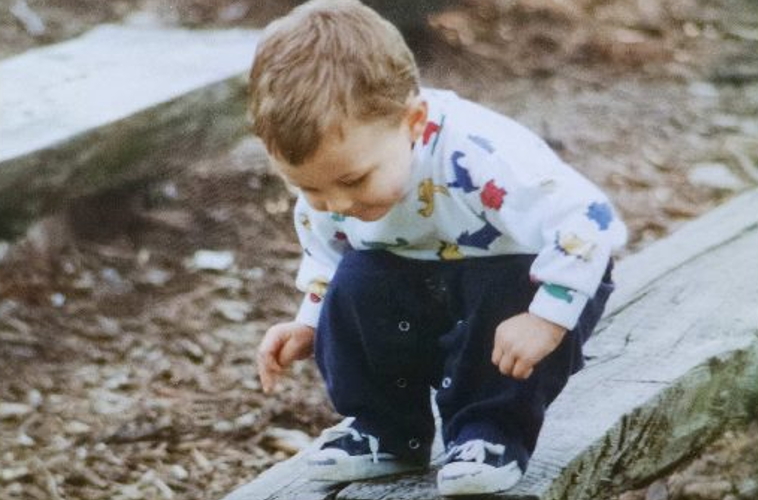I took this photo of my son, 18 months old and poised to jump off the bench to the ground below. The picture captured his fearless love of adventure so clearly. At the age of two he climbed up to the top bunk and jumped off into a bin of stuffed animals below. He is still adventurous but lately I’ve come to realize that he isn’t without fear or doubts. In other words, he is a normal young man. I’d been thinking about gender roles when I came across a recent article by Tim Winton discussing how toxic masculinity is shackling men to misogyny. “I don’t have any grand theory about masculinity,” he wrote, “but I know a bit about boys.”
Having raised three sons I too know a bit about boys and I enjoyed reading what Winton had to say on this issue. I’ve been thinking about the MeToo movement and how it may be affecting men and boys. I applaud women for having the courage to speak up; having had similar experiences of my own I am not immune to the anger that fuels this movement. But I worry we are losing our ability to define or encourage normal, healthy masculine behavior. Perhaps in our hurry to support women we’re ignoring the reasons why some men become misogynistic. I found Winton’s description and insights helpful.
“What a mystery a boy is. Even to a grown man. Perhaps especially to a grown man. And how easy it is to forget what beautiful creatures they are. There’s so much about them and in them that’s lovely. Graceful. Dreamy. Vulnerable. Qualities we either don’t notice, or simply blind ourselves to. You see, there’s great native tenderness in children. In boys, as much as in girls. But so often I see boys having the tenderness shamed out of them.”
It was difficult as a parent watching sports, peer pressure, and the media telling my sons it’s not OK to be vulnerable, to express their fear of rejection, or to feel gentleness, compassion and kindness towards others. Society keeps insisting (to boys and girls) that success in life requires that we become competitive in ways I think are unhealthy. I’ve watched too many coaches demean and punish their players if they weren’t competitive enough; if they didn’t have the “killer” instinct in them. As an athlete I played hard and loved to win, but I never felt winning (in sports or business) was about crushing my opponent. I was passionate about playing basketball and there was nothing I enjoyed more than good competition; shaking hands after the game, giving and receiving a nod of respect for a game well played no matter how the score ended.
Winton writes “Boys and young men are so routinely expected to betray their better natures, to smother their consciences, to renounce the best of themselves and submit to something low and mean. As if there’s only one way of being a bloke, one valid interpretation of the part, the role, if you like. There’s a constant pressure to enlist, to pull on the uniform of misogyny and join the Shithead Army that enforces and polices sexism.”
Misogyny is contempt and ingrained prejudice against women, the extreme version of sexism. Misogyny is also the warping of masculinity and strength into dominance and aggression. Boys are taught that to be a man they must be hard and unfeeling, that being sensitive makes you inherently weak. We teach young men that to be confident they must suppress their uncertainty, to always act as if they are right. We rarely seem to acknowledge how confined and debilitated men are stuck within the narrow confines of masculinity allowed. And now I fear that men feel under attack for the inappropriate and shameful behavior of a minority of callous exploiters and sociopaths. I worry about the confusion men might be feeling, analyzing their every behavior towards women, unsure any longer what is acceptable or not. In many ways we’ve all become self conscious except perhaps those who are incapable of good conduct. In some men the confusion will lead to resentment and anger. And I wonder what boys, in the process of becoming men, will learn from this moment in history?
Winton points out that “Toxic masculinity is a burden to men. I’m not for a moment suggesting men and women suffer equally from misogyny, because that’s clearly and fundamentally not true. And nobody needs to hear me mansplaining on the subject of the patriarchy. But I think we forget or simply don’t notice the ways in which men, too, are shackled by misogyny. It narrows their lives. Distorts them. And that sort of damage radiates; it travels, just as trauma is embedded and travels and metastasizes in families. Slavery should have taught us that. The Stolen Generations are still teaching us. Misogyny, like racism, is one of the great engines of intergenerational trauma.” The African-American community suffers the loss of so many promising young men to drugs and crime, now dead or incarcerated in jail. I fear the same for all the young men who fall prey to white supremacy, the misogynist message fueled by anger, resentment, and entitlement.
Winton is talking about the damage we inflict on boys by telling them they need to fight to win, tolerating bullying and aggression as a sign of strength. “When you’re bred for mastery, when you’re trained to endure and fight and suppress empathy, how do you find your way in a world that cannot be mastered? How do you live a life in which all of us must eventually surrender and come to terms? Too many men are blunt instruments. Otherwise known, I guess, as tools. Because of poor training, they’re simply not fit for purpose. Because life is not a race, it’s not a game, and it’s not a fight.”
This is what bothered me when I heard women who voted for Trump justify his comments about pussy grabbing as just “locker-room talk”. There is nothing that justified his inappropriate behavior! Far too often we act as if the ends justify the means. If boys need to be toughened to make them men, then so be it, shaming them for being emotional is justified. If the only way to be manly is to be a winner, then it doesn’t matter how one wins, it only matters that you aren’t a loser. Compassion, kindness, and gentleness are not traits we encourage in boys or men. Movies portray “real men” as those who fight to conquer, who destroy at any cost to win. A boy’s natural adventurous, exuberant nature is channeled and distorted into conquering and exploiting others. It doesn’t matter how you treat your opponents even torture to get what you want. Is it really so surprising that white male supremacy has reared its ugly head again?
I agree with Winton that “We’ve scraped our culture bare of ritual pathways to adulthood.” The man-cave, and now ironically the she-cave, sends a message that it’s acceptable to isolate yourself in selfish, privileged indulgence. We seem to be saying it’s acceptable to think about what “I” want no matter how it affects others. In marriage, my husband and I find camaraderie in spending time together, not apart in separate “caves”. We taught our children to become adults by spending time with them, being examples of adult behavior. They enjoy conversations with us, and with our adult friends! I once asked my son why his friends seemed afraid to talk to me. He told me that few teenagers talk to their parents and they aren’t comfortable talking to adults. How sad for our society!
Raising boys to adulthood is probably different from raising girls but I am only experienced raising sons. I did, however, grow up in a family with four girls and one boy. My mother seemed to prefer raising girls to boys. My brother was very active, and he thrived in exploration; needing to climb on top of or touch everything and examine it up close to see what made it work. He would come home covered in mud, pockets stuffed with bits of things he found along the way. He would bring home wounded wild creatures and cry when they died! He kept them in shoe boxes under his bed, only discovered when the odor became objectionable. Somehow my mother didn’t find it easy living with his energy, free spirit, and adventurous nature. But having grown up with four sisters he has always been comfortable relating to women; he learned to be respectful but didn’t tolerate our abuse!
I soon found in my own sons very similar behaviors and saw this as normal. I noticed that they all liked to pick up sticks and whack things. Not sure why, but this seemed universal. They liked to announce themselves loudly when entering the house; leaving a trail of mud, shoes, clothing, or toys dropped along the way. They were always messy! I once told my son he needed to clean his room and he asked me, in all seriousness, if he could just clear a path from the door to the bed. When asked why they did something they seldom knew the reason, something I just had to accept was also normal. They loved it when I read them books and became good readers. They loved climbing up on the kitchen counter to stir the cookie dough and became competent at cooking. They are smart, funny, intelligent and caring young men and I continue to enjoy watching them develop into manhood. They may hate it when I remind them to wear a coat, but they admit they feel secure because they know their parents care for and about them.
Winton writes
“Children are born wild. And that’s beautiful, it’s wondrous, regardless of gender. Even when they’re feral creatures, kids are reservoirs of tenderness and empathy. But some do turn into savages. And sadly most of those are boys. They’re trained into it. Because of neglect or indulgence. Can we wean boys off machismo and misogyny? Will they ever relinquish the race, the game, the fight, and join the dance? I hope so. Because liberation – a process of disarmament, reflection and renewal – isn’t just desirable, it’s desperately necessary.”
He ends his article by writing:
“We have to acknowledge the awkward, implacable fact of [boys] existence, especially those who most offend our sensibilities. We should resist our instinct or our ideological desire to cross the street to avoid them, our impulse to shut them down and shut them out and finally lock them up. We need to have higher expectations of them. Provide better modeling for them. But before any of that is possible we need to attend to them. Yes, boys need their unexamined privilege curtailed. Just as they need certain proscribed privileges and behaviours made available to them. But the first step is to notice them. To find them worthy of our interest. As subjects, not objects. How else can we hope to take responsibility for them? And it’s men who need to step up and finally take their full share of that responsibility.”
I agree but I would argue that it is both men and women who need to take their full share of that responsibility. Yes, we need to pay attention to boy’s existence and attend to them. We need to encourage their explorations and adventures, tolerate their impulsiveness, while admonishing inappropriate behavior. There is much to admire in men whose masculinity is expressed as strength, courage and honor. But being masculine doesn’t mean that a man must conquer and subjugate! Being strong is also being willing to ask for help when needed, to offer comfort and aid to others. Our sons and daughters may get hurt when they climb and jump, but life is often a leap of faith. Hopefully as parents, we will always encourage them to jump and be there to catch them should they fall!






